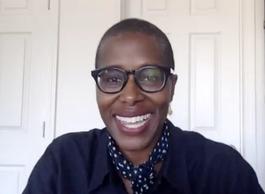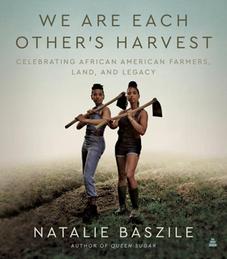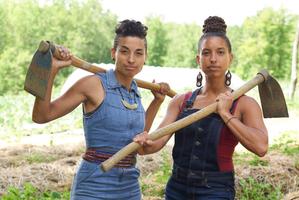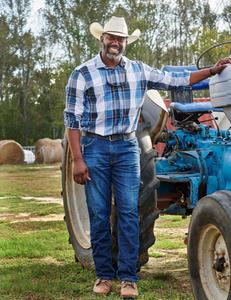 CALIBA president Melinda Powers of Bookshop Santa Cruz kicked off Monday afternoon's Discovery Lab programming by introducing Natalie Baszile, who shared her forthcoming book, We Are Each Other's Harvest: Celebrating African American Farmers, Land, and Legacy (Amistad, April 2021).
CALIBA president Melinda Powers of Bookshop Santa Cruz kicked off Monday afternoon's Discovery Lab programming by introducing Natalie Baszile, who shared her forthcoming book, We Are Each Other's Harvest: Celebrating African American Farmers, Land, and Legacy (Amistad, April 2021).
The book, filled with gorgeous full-color photographs, testimonials, essays and poetry, is "celebratory even as it explores challenging themes," said Baszile, many of which she explored in her novel Queen Sugar, now an OWN TV series. "I've always been interested in the story of Black farmers," Baszile explained. "Part of that is my love of farming and gardening and being connected to the earth." While Queen Sugar explored her Southern roots on her father's side, this book pays homage to her mother's side, to Baszile's maternal great-great grandfather, Mack Hall, born in 1845. "After emancipation, he was a beekeeper, a merchant and a farmer who owned almost 600 acres of land near Tuskegee, Alabama."

|
|
| Natalie Baszile | |
The author took her title from the last lines of Gwendolyn Brooks's poem "Paul Robeson": "We are each other's/ harvest:/ we are each other's/ business:/ we are each other's/ magnitude and bond." With this book, Baszile said, she wanted to give some context to land ownership and land stewardship. While most people think of farmers as middle-aged white men, she continued, "Our story of the connection to the land is just as deep." It stretches back to emancipation, with the story of General Sherman's Field Order No. 15, "which most of us know as 40 acres and a mule."
 As General Sherman approached Atlanta, Secretary of War Edwin Stanton met with 20 Black ministers and asked them, "What do you want for your people, following the war?" Garrison Frazier, who was a slave until 1857, when he bought his own freedom and that of his wife, was one of those ministers. He said the best way they can take care of ourselves is to have land "and turn it and till it by our own labor." More than 400,000 acres of the coastline from South Carolina to Georgia to Florida was divided into 40-acre parcels and settled by formerly enslaved people. "That settlement, that early ownership resonates today," Baszile said. "By 1920, there were almost one million Black farmers. That number dwindled to 45,000 Black farmers within the last century. What has happened since the 1920s to contribute to that decline in land ownership?"
As General Sherman approached Atlanta, Secretary of War Edwin Stanton met with 20 Black ministers and asked them, "What do you want for your people, following the war?" Garrison Frazier, who was a slave until 1857, when he bought his own freedom and that of his wife, was one of those ministers. He said the best way they can take care of ourselves is to have land "and turn it and till it by our own labor." More than 400,000 acres of the coastline from South Carolina to Georgia to Florida was divided into 40-acre parcels and settled by formerly enslaved people. "That settlement, that early ownership resonates today," Baszile said. "By 1920, there were almost one million Black farmers. That number dwindled to 45,000 Black farmers within the last century. What has happened since the 1920s to contribute to that decline in land ownership?"

|
|
| Leah and Naima Penniman, co-founders of Soulfire Farm in upstate New York (photo: Alison Gootee) |
|
Baszile noted that Black land loss has been the subject of numerous publications. Pete Daniel wrote Dispossession: Discrimination Against African American Farmers in the Age of Civil Rights (University of North Carolina Press), about the historical role that the U.S. Department of Agriculture has played in disenfranchising Black farmers in the last century. Baszile bought the rights to include in her book "Kicked Off the Land" by Lizzie Presser (which ran in the New Yorker in July 2019)--the story of the Reels brothers in North Carolina, who spent eight years fighting their case in jail to try to protect their land. Black Americans, after Reconstruction, were suspicious of the U.S. government; they did not want to set up trusts and wills. Their land was distributed to their heirs and heirs of heirs. "So now that land was held by hundreds of cousins," Baszile said. "Speculators use loopholes in the law to force the sale of this land. Along the coast of South Carolina and Georgia are now places like Hilton Head, built on land once held by Black families."
 |
|
| Marvin Frank, a retired special forces vet-turned-farmer. (photo: Alison Gootee) |
|
Baszile also includes in her book pieces by Elizabeth Alexander, Ross Gay and Robin Coste Lewis and Michael Twitty, author of The Cooking Gene: A Journey Through African American Culinary History in the Old South. A conversation with Jason Wilborn, one of the writers on the Queen Sugar series, who had his own connection to farming, was crafted into an essay included in her book.
Alison Gootee and Malcom Williams and Baszile traveled all around the country in 2019 photographing farmers and interviewing people like Naima and Leah Penniman at the Soulfire Farm in Upstate New York. They call themselves the "returning generation" and are at the forefront of this movement of young farmers leaving urban centers to return to the land, said Baszile.
Marvin Frank, a retired special forces vet, farms as a way to treat his PTSD. He told Baszile of being on the brink of suicide when his father called him back to Florida to help him farm. Frank now farms in North Carolina as "agratherapy" and invites other vets join him.
"COVID has shown us the importance of knowing where our food comes from," Baszile said. "Food sovereignty, food justice, climate change--these are all part of the book, both directly and indirectly." --Jennifer M. Brown, senior editor

